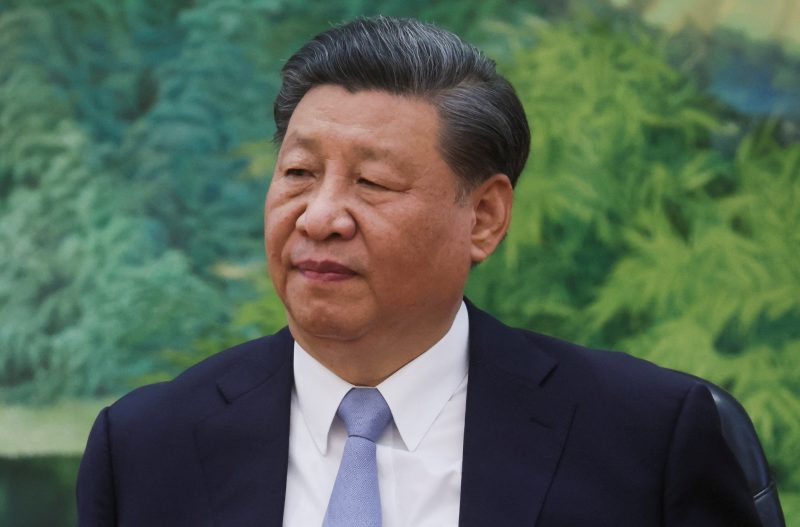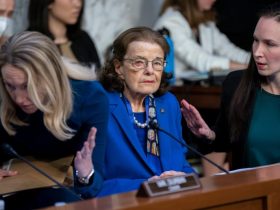China called President Biden’s suggestion that its leader is a dictator “extremely absurd and irresponsible” on Wednesday, potentially undoing recent hard-won efforts to calm tensions between the two superpowers.
Biden’s comments came barely a day after Secretary of State Antony Blinken met Xi Jinping in Beijing, in a bid to forge a tentative way past the tensions that have bedeviled relations since a Chinese spy balloon floated across the United States in February.
Biden referred to Xi as a dictator while speaking at a campaign event on Tuesday, where he said the Chinese leader had been embarrassed by the spy balloon because he was unaware it had gone off course.
“The reason why Xi Jinping got very upset in terms of when I shot that balloon down with two boxcars full of spy equipment in it is he didn’t know it was there,” Biden said. “That’s what’s a great embarrassment for dictators, when they didn’t know what happened.”
The downing of the balloon in February further escalated tensions between Washington and Beijing, which were already at odds over economic and military issues.
Though Blinken said following his meetings with Chinese officials this week that Washington considered the matter of the balloon closed, Biden’s comments struck a nerve in Beijing.
China considered Biden’s statements “an open political provocation” to which “China is strongly dissatisfied and firmly opposed,” Chinese Foreign Ministry spokeswoman Mao Ning said at a briefing Wednesday.
“The remarks made by the U.S. are extremely absurd and irresponsible,” she said. “They are a serious violation of basic facts, diplomatic etiquette and China’s political dignity.”
The spy balloon episode had been an accident, Mao said. The United States “should have handled the incident in a calm, rational and professional manner.” Instead, Washington had “distorted the facts” and “hyped up the incident.”
John Delury, a professor of Chinese studies at Yonsei University in Seoul, said Biden’s remark could “imperil the diplomatic initiative.”
While Blinken’s mission did not result in tangible agreements or declarations, the “substance was the diplomacy,” Delury said. “It was meeting and being respectful and cordial and sitting down face to face.”
Such an inflammatory remark so soon after the visit, Delury said, “does jeopardize some of what was done.”
The White House did not immediately respond to a request for comment seeking clarification on Biden’s remark. He is known for gaffes, and it was not immediately clear if the White House would attempt to draw back his comments, as it has done before.
Biden has mused about Xi’s style of power before. At a fundraising event last year — which was held at a private home, just as Tuesday’s event was — Biden said that the Chinese leader “doesn’t have a democratic — with a small ‘d’ — bone in his body.”
Biden said at the event in April 2022 that Xi “doesn’t think that democracies can be sustained in the 21st century, in the second quarter of the century, because things are moving so rapidly, so incredibly fast that only — he doesn’t say ‘autocracy’ — only autocracies are able to handle it,” adding that Xi had been “very straightforward with me” and that the pair had discussed the matter of democracy before.
Biden and Xi last met in November on the sidelines of the Group of 20 summit in Bali, Indonesia. The meeting has been held up as a benchmark for the relationship, as it was in Bali that the two sides agreed it was in their interests to cooperate rather than let relations continue to deteriorate.
In Bali, Biden said there would be no “new Cold War,” and that it was important for the two countries to “be able to work together” on solving global issues such as climate change and food insecurity. Xi said in remarks before their meeting that “the world expects that China and the United States will properly handle the relationship.”
Many democracies have grown concerned by Xi’s increasingly authoritarian tendencies, but few world leaders have outright used the word dictator to describe him.
In October, Xi consolidated his power to a degree not seen in decades when he secured a third term as general secretary and head of the Central Military Commission, the Chinese Communist Party’s two most important positions.
Since first claiming the role of China’s top leader in 2012, Xi has increasingly elevated his personal status within the party. He did away with presidential term limits in 2018, paving the way for a third term and defying unspoken rules that had been instated by previous Chinese leaders in the hopes of preventing one-man rule.
Under Xi’s leadership, China has seen an expansion of mass surveillance and crackdowns on civil society, a campaign of mass detention in the western Xinjiang region, as well as a harsh security clampdown in Hong Kong and military aggression in the Taiwan Strait.
Vic Chiang contributed to this report.








